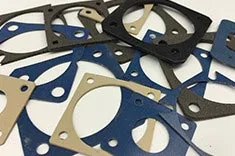EMI Shielding Products
- Custom Gasket Fabrication
- Connector Gaskets
- Bonded O Ring
- Custom Gaskets
- Conduct-O-Knit Knitted Wire Mesh
- Conduct-O-Seal Combo Gasket
- Conduct-O-Elastomer
- Conduct-O-Seal Oriented Wire in Silicone Gasket Material
- Conduct-O-Mesh Tape
- Conduct-O-Foam
- Conduct-O-Bond
- Optical Filters For Electronic Displays
- Shielded Vent Panels
- 300 Series
Three Most Common Questions about EMI Shielding
Electromagnetic Interference (EMI) is an unintended side effect from using electronic devices. As more and more electronics surround us every day, problems with EMI are getting worse. If the matter were left alone, it would be hard, if possible, for electronic devices to correctly work. When an Mp3 player is negatively affected by EMI it can be annoying, but when the problem happens with medical and transportation equipment, the results can be deadly.  There are many intricate facets of dealing with EMI, and so below we will be going over some of the most common questions we hear about electromagnetic interference.
There are many intricate facets of dealing with EMI, and so below we will be going over some of the most common questions we hear about electromagnetic interference.
What is electromagnetic shielding and how does it work?
Shields are built from high permeability materials because they are about to absorb and redirect magnetic forces from their targets. Of all the protectors on the market, the most effective versions are created as enclosures that have cap ends. Fields of magnetism will follow the enclosure lines, which prevents stray fields from creating unintended interference.
Why do electromagnetic fields need shielding?
Electronic devices are becoming smaller and smaller, and as a result, a designer must densely pack electronic assemblies. Internal components will interfere with each other causing electronics to malfunction. EMI is responsible for low-level frequency radiation, which can only be protected with EMI shielding.
What are the primary sources of EMI?
Electromagnetic interference is created through natural causes and human-made causes. Natural causes for EMI come from lightning and radiation. The most common causes of human-made EMI are:
- Fluorescent lights
- Radar/communications transmitters
- Motors/switches
- Computers and computer parts
- Power lines
EMI Shielding
If you have any specific questions about EMI shielding and your electronics, you shouldn’t hesitate to give our team a call. We specialize in creating custom EMI gaskets and EMI shields.
Related Reading
- Why Does Plastic Electronics Need EMI Shielding?If you build electronic devices with plastic parts or housings, do not neglect the device’s need for protection from EMI and RFI. We provide top-quality RFI shielding and EMI shielding.
- EMI Shielding Measurements and Testing
- EMI Gaskets and Shielding for the Modern Automotive Industry



